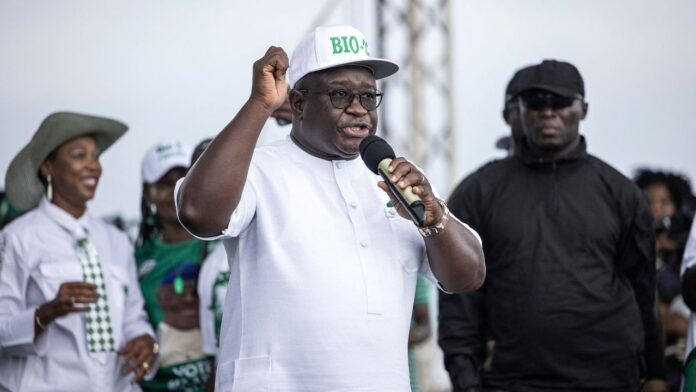
In response to concerns about the integrity of Sierra Leone’s recent presidential and general elections, the United States government on Thursday announced visa restrictions on individuals believed to have played a role in undermining democracy.
The move comes as the aftermath of the June 24, 2023 elections remains mired in controversy due to alleged election irregularities and lack of transparency.
“Today, I am announcing a new visa restriction policy under Section 212(a)(3)C) of the Immigration and Nationality Act for undermining the democratic process in the June 2023 Sierra Leone election,” declared U.S. Secretary of State Antony Blinken.
Under this policy, Blinken said the United States will pursue visa restrictions for those believed to be responsible for, or complicit in, undermining democracy in Sierra Leone, including through the “manipulation or rigging of the electoral process; intimidation of voters, election observers, or civil society organizations through threats or acts of physical violence; or the abuse or violation of related human rights in Sierra Leone.”
He added that Family members of such persons may also be subject to these restrictions. Persons who undermine the democratic process in Sierra Leone—including in the lead-up to, during, and following Sierra Leone’s 2023 elections—may be found ineligible for U.S. visas under this policy.
However, he clarified that the visa restriction policy will apply to specific individuals and is not directed at the Sierra Leonean people. The decision, he stated, reflects the commitment of the United States to support Sierra Leoneans’ aspirations to have free and fair elections that demonstrate the will of the people and strengthen democracy and the rule of law.
While the State Department has not disclosed names of those hit by the restriction, local media in Sierra Leone are already reporting that President Julius Madaa Bio and hosts of his officials were affected by the ban. FrontPage Africa is yet to verify these claims.
However, critics and political observers say the U.S. government’s decision to impose a broad visa ban stems from concerns about the refusal of Sierra Leone’s electoral commission to publish disaggregated polling station results. This refusal has raised questions about the transparency and credibility of the electoral process. Specifically, the lack of detailed results has fueled accusations from the main opposition All People’s Congress (APC) party that the election was manipulated to favor incumbent President Bio.
Amidst this backdrop of political tension, the APC party boycotted the country’s parliament and refused to engage with the government led by President Bio. The resulting political crisis has exacerbated Sierra Leone’s existing economic challenges, leading to growing concerns over human rights abuses and civil liberties restrictions, according to the Sierra Leone Telegraph.
It stated that the U.S. government had already frozen substantial amounts of aid designated for Sierra Leone due to concerns about election irregularities. Despite calls for political dialogue from the Commonwealth Secretariat and the international community, President Bio has yet to seek a peaceful resolution to the crisis.
The APC party has called for a fresh election under the supervision of a reconstituted electoral commission, with the oversight of the Commonwealth Secretariat. The party’s insistence on electoral integrity aligns with the broader efforts to restore faith in Sierra Leone’s democratic process.
Meanwhile, this latest development comes as neighboring Liberia goes to its crucial polls On October 10, 2023. In a crowded election with 20 presidential candidates, two of the top political parties – the ruling Coalition for Democratic Change (CDC) and the opposition Unity Party (UP) are predicting an outright victory.
In a recent interview with the Voice of America, the UP Standard bearer former Vice President Jewel Howard Taylor said his party and its allies have “never been proponents of a second round.”
“We have never been the ones looking for a second. One round is what UP and other collaborators are looking for. They know very well that the Weah government is a no-go-forward for Liberia,” he said. “I believe [this is] what will make Weah [lose the election] so that the country [would] begin to see improvement, growth, and development.”
In a counterargument, the incumbent, President Weah, flanked by his Vice President Joseph Boakai are touring the country campaigning on a one-round victory. Across major cities, large CDC campaign banners carry the message: “ONE ROUND VICTORY IS SURE”.
Diplomats, however, have expressed concern that if President Weah were to secure a first-round victory, it might raise suspicions of electoral manipulation—reminiscent of allegations made in 1985 and 1997.
A foreign diplomat disclosed to FrontPage Africa recently that the U.S. Embassy in Liberia has already conveyed to senior Liberian government officials, members of the Weah Campaign Team, and the Unity Party team that achieving a first-round victory amidst the large field of 20 presidential candidates appears improbable.
Likewise, they are troubled by opposition parties generating similar claims, thereby inflating the expectations of their supporters, a trend that could have adverse consequences.
The diplomats are wary that while the notion of a first-round victory is being advocated with the intention of energizing the political party base, it could also engender unrealistic expectations leading to potentially negative outcomes. A diplomat, who insisted on anonymity, said, “In effect, they are being asked to tread lightly,” the diplomat speaking strictly on condition of anonymity said at the weekend.
With the latest action taken against some officials of Sierra Leone, observers say, Liberian officials and politicians should be careful over their actions and behaviors leading to, during and after the October 10 polls, or risk the wrath of Uncle Sam.
Reporting by Gerald C. Koinyeneh





















